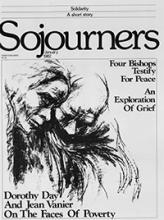Loaves and Fishes sketches the history and the vision of The Catholic Worker, the radical Catholic newspaper founded by Peter Maurin and Dorothy Day in 1933. The book, written by Dorothy Day in the 1960s, has since gone out of print. The following article is taken from three chapters of Part II on "Poverty and Precarity." Reprinted with permission from Harper and Row Publishers, Inc. --The Editors
Poverty is a strange and elusive thing. I have tried to write about it, its joys and sorrows, for thirty years now; and I could probably write about it for another thirty without conveying what I feel about it as well as I would like. I condemn poverty and I advocate it; poverty is simple and complex at once; it is a social phenomenon and a personal matter. Poverty is an elusive thing, and a paradoxical one.
We need always to be thinking and writing about it, for if we are not among its victims its reality fades from us. We must talk about poverty because people insulated by their own comfort lose sight of it. So many good souls who visit us tell us how they were brought up in poverty, but how, through hard work and cooperation, their parents managed to educate all the children--even raise up priests and nuns for the Church. They contend that healthful habits and a stable family situation enable people to escape from the poverty class, no matter how mean the slum they may once have been forced to live in. The argument runs, so why can't everybody do it? No, these people don't know about the poor. Their concept of poverty is of something as neat and well ordered as a nun's cell.
Read the Full Article

